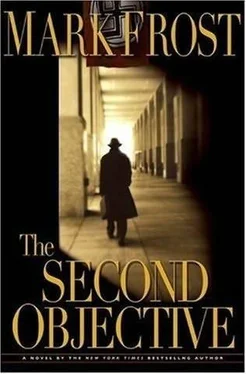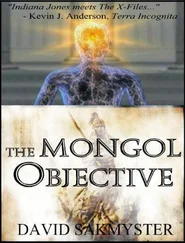Von Leinsdorf and Bernie dove to the floor as more bullets whistled overhead. The wounded American kid crawled against the rear wall and began screaming for his mother as more rounds kicked through the room.
Bernie crawled to the open door and pushed it almost shut. A ghostly line of German paratroopers in white parkas and winter camouflage emerged from the fog, submachine guns firing. From behind them, the muzzle of a white panzer appeared, and then, moments later, the hulking body of the tank, painted a ghostly white, drove into the clearing. Von Leinsdorf crawled over to Bernie.
“I told you we should have fucking killed them,” he said in Bernie’s ear.
The panzer rolled toward the cottage as paratroopers trotted past the building, picking off survivors running ahead of them. Von Leinsdorf crawled to the wounded American boy and held a hand over his mouth. Pressed against the base of the wall, the last two riflemen looked to Von Leinsdorf for orders, close to cracking, ready to bolt like the others. He gestured at them to stay put.
Bernie saw the parka of a German soldier who was peering in through the cottage window. He pressed his face forward trying to see through the crude glass and his breath condensed on the pane. The Americans huddled directly under the window below him, unseen, terrified. Von Leinsdorf kept his hand clamped over the wounded GI’s mouth, pulled his knife, and held it to his throat. A moment later the German soldier moved away. Bernie raised onto his knees to peer out the same window. What he saw coming drove him to dive down away from the wall.
The barrel of the panzer’s cannon smashed through the window, penetrating halfway across the room. It paused for a moment and then swung violently to the right, toppling furniture, knocking over shelves. Bernie flattened himself against the wall closest to the tank, away from where the machine gun was mounted. He heard the engine engage as the barrel swung back to the left. Muffled shouting issued from inside the tank. Someone reloaded the machine gun.
The Americans panicked and ran for the back door. Bernie turned in time to see Von Leinsdorf cut the throat of the wounded GI. He heard the crew in the tank crank another shell into the chamber, and sprinted for the door as the cannon fired. The shot blew away the back wall of the cottage just as Bernie and Von Leinsdorf hurled themselves out the doorway. Bernie felt the concussion ripple through his body from behind, and the crack of the explosion deafened him.
Bernie landed facedown in the snow. He turned and looked up, groggy, lost in a white, silent world. His senses haywire, he staggered to his hands and knees, trying to remember where he was. A shrill, bell-like tone screamed out of the deep silence and pierced his mind. He felt someone grabbing for him, tugging him to his feet by the sleeve-Von Leinsdorf-then pulling him into the fog. Bernie saw the spinning tracks of the panzer, reversing away from the shattered cottage wall. A boot landed in the snow near him, with a leg still in it. He felt something wet on his face, wiped at it, and his hand came away smeared with blood, the bright red shocking amid all the white.
They lurched into the fog, Bernie trailing Von Leinsdorf, trying to keep him in sight. He knew he was shouting, but he couldn’t hear his own voice. Von Leinsdorf vanished ahead of him in the fog. Bernie turned his head to look for him, and a tree hurtled at him out of the white. He had no time to stop or change course-a low-hanging branch clotheslined him across the neck and everything went black.
Malmédy
DECEMBER 17, 8:00 A.M.
The order came down from First Army headquarters in Spa shortly after 7:30 A.M. to abandon the 67th Evacuation Hospital. The situation to the east had grown steadily worse during the night, as waves of new wounded continued to arrive, overwhelming the facility. Confirmation that Waffen -SS panzer divisions were moving toward Malmédy hastened the decision to withdraw; stories about their atrocities to female prisoners preceded them. Doctors and nurses were ordered to drop everything and take only what they could carry. The hospital’s chief surgeon asked a skeleton staff of five volunteers to stay behind and tend the few men who were too critically wounded to transport. Every nurse in the ward raised her hand, so they had to choose by drawing lots.
Earl Grannit and Ole Carlson had worked through the night on a borrowed typewriter, piecing together the investigation until they’d condensed it to five pages. After placing repeated calls on deteriorating phone lines to Spa and Liège, Grannit finally got through to a reconnaissance officer at First Army headquarters shortly after dawn.
“There’s a hundred damn rivers in this part of Belgium,” said Grannit. “We’re trying to figure out which one we’re looking at here.”
After describing in detail the map of the river he’d found in the boot of the dead German, Grannit held on the line while the officer consulted his charts.
“Sounds like the Meuse,” said the officer. “There’s three bridges southwest of Liège at Engis, Amay, and Huy.”
“How far apart are they?”
“They’re all within twenty miles of each other. You got any maps with you?”
Carlson handed him one, folded to that section of the river. “I’m looking at it. What’s their tactical significance?”
The officer thought for a moment. “If Jerry’s looking to get across the Meuse, that’d be a damn good place to try-”
“How so? What good does it do them to cross that far south?” asked Grannit.
The line crackled and went dead. Grannit jiggled the receiver but couldn’t reestablish the connection. Another shell exploded nearby outside. Ole ducked instinctively, but Grannit didn’t move, lost in thought.
“Earl?”
“Let’s go,” he said finally, heading outside. “Bring the maps.”
A fleet of trucks and ambulances lined up behind the tents to convoy patients and staff back toward Liège. V1 rockets and German planes continued to scream westward above the clouds overhead. Red crosses were being hastily painted on the canvas tops of the transports, as the staff hoped to ward off attack from the air.
Grannit climbed behind the wheel of their jeep, and they fought their way out of the congestion surrounding the hospital. He headed west, dodging around a brigade of American armor moving toward Malmédy. Their CO, standing up in a Willys at the rear of the column, shouted at them for directions. Grannit pointed them toward Malmédy, moved the jeep off to the shoulder, and kept driving.
“I was thinking, shouldn’t we tell somebody what we know?” asked Carlson.
“What do we know, Ole?”
“You know, about the Krauts and the murders and-” Ole stuttered for a moment.
“And what?”
“I don’t know what. But somebody at HQ ought to hear about this.”
“We tried, Ole. Nobody’s answering the god damn phone.”
“Well, we should just drive over there.”
“They’ve got their hands full. For all we know they’re not even there anymore.”
“But these guys are killing GIs, Earl.”
“There’s a lot of that going around today.”
“But they’re Krauts-”
“I know that, Ole, and you know that, and we’re gonna tell ’em soon as we know what the hell they’re doing here. That’s our job now. Make sense of it first.”
Grannit swerved as another shell landed by the side of the road.
“Everybody’s got their job today and we got ours, okay? And, by the way, mine doesn’t include having to cheer you the fuck up,” said Grannit.
Baugnez Crossroads, Belgium
DECEMBER 17, 1:00 P.M.
“Private Tenella! Private Tenella!”
Читать дальше












